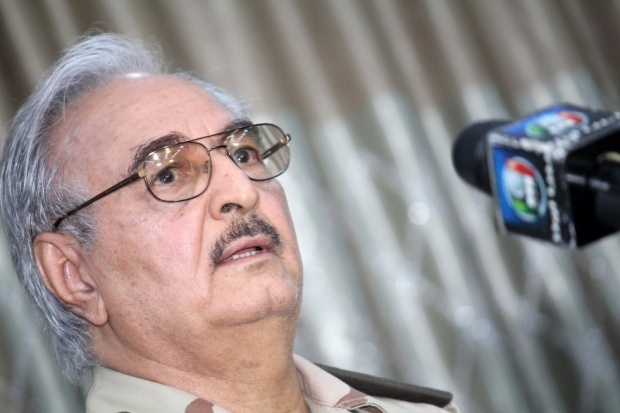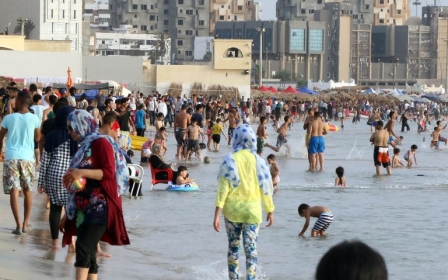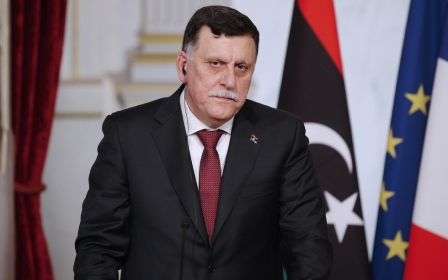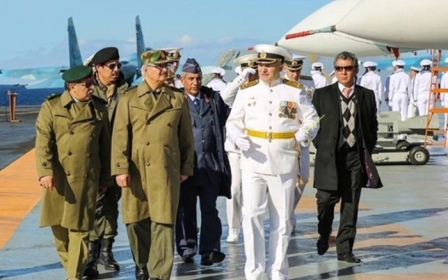Libyan politician Belhaj: Haftar has 'no chance' of ruling country
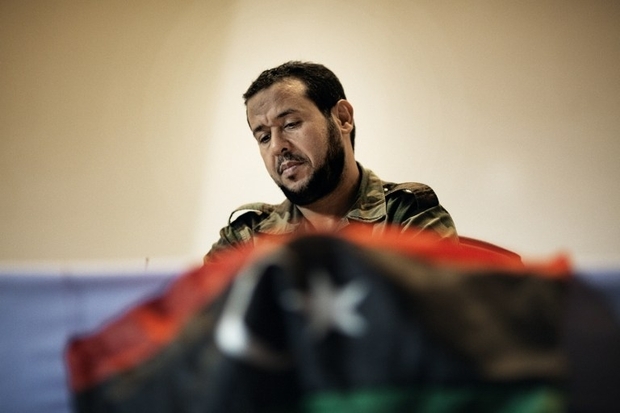
As Libya celebrates six years since the 2011 uprisings on Friday, Libyan politician Abdel Hakim Belhaj said that a government led by military strongman Khalifa Haftar has no chance of success in Libya.
“A military leadership will never take hold of Libya,” Belhaj told Middle East Eye. “Haftar has no chance at ruling this country at all and the coming days will attest to this.”
'Haftar has no chance at ruling this country at all and the coming days will attest to this'
Abdel Hakim Belhaj
Belhaj, who heads the Watan Party, is based in Tripoli where the UN-brokered Government of National Accord (GNA) has held power since December 2015. But the GNA's authority faces huge challenges.
In the east, the rival Tobruk-based House of Representatives (HoR) is aligned Haftar, a self-described anti-Islamist general who leads the Libyan National Army (LNA).
“The political divisions in Libya have impacted the situation to the extent that we now have two governments, and two parliaments and two armies,” Belhaj told Middle East Eye.
EXCLUSIVE: Interview with Libyan politician Abdel Hakim Belhaj
Tensions have escalated as Haftar’s LNA, which controls eastern Libya, has pushed southwards, clashing with militias from the western city of Misrata, which are loyal to the UN-backed government and led the fight against Islamic State group in Sirte.
Political stalemate
Egypt-allied Haftar and the head of the Presidential Council of the GNA, Fayez Al-Sarraj, met in Cairo earlier this week as part of a series of Tunisian-Algerian-Egyptian initiatives aimed at resolving Libya’s crisis.
Although Sarraj and Haftar refused to meet face-to-face, they agreed to honor a plan to create a joint committee to negotiate reconciliation and elections by February 2018, despite lingering tensions.
The discussions revolved around forming a mini-government that would have a unified military council headed by Haftar in cooperation with military officers from all across Libya.
The initiative reportedly gathered support from Algeria, Tunisia and Egypt, three countries that have over the past months been involved in mediation efforts focused on launching a Libya-Libya dialogue for national reconciliation.
According to Libya expert and policy fellow for ECFR's Middle East & North Africa programme Mattia Toaldo: "The political process is in a deadlock and the failure of the meeting yesterday is a demonstration of the stalemate."
Despite the combined pressure from Algeria, Tunisia and Egypt to resume peace talks, Toaldo believes "the political process is unlikely to move forward in the foreseeable future because on the one hand Haftar is convinced he doesn’t need a deal and the other side is very fragmented," said Toaldo.
Egypt's role in Libya
While Belhaj welcomed regional efforts to bring peace to Libya, highlighting “that stability in Libya is essential for the wider region”, he condemned Egypt’s support for Haftar, calling it counterproductive.
“Egypt and the UAE continue to provide military support to Haftar’s forces and militias,” said Belhaj, who says his party was involved in documenting these claims and presenting them to a UN delegation in Libya recently.
“Even Saqr al-Jaroushi, commander of Libya’s air force, admitted that they [the HoR] received tens of containers filled with ammunition from Egypt,” he added.
Belhaj vows to fight case against UK officials 'to the end'
Jaroushi is the head of internationally recognised Tobruk-based HoR air force, has material backing from countries including Egypt and the UAE, in battling against various militia groups, some of which are allied to the government in Tripoli.
Belhaj called on Egypt to “correct its stance” and work to support the stability of Libya rather than supporting one faction over the other.
“Egypt is a neighbouring country and we are bound by historical, tribal and demographic ties and common interests. Why don’t we value and protect these ties that bring us together.”
‘A real dialogue’
Belhaj insists that instead of a military solution, which Haftar has repeatedly called for, “a real dialogue bringing together Libya’s rival factions is the only way forward.”
He went on to highlight the weakness of the GNA and the PC, which was borne out of the signing of the UN-brokered Libyan Political Agreement (LPA), also known as the Skhirat Agreement, in December 2015.
“The PC has failed to unite Libyans and suffers deep divisions and a weak leadership,” he explained. “It has clearly failed to engage in the most pressing issues facing the Libyan people,” siting a lack in basic services and security throughout.
According to Belhaj, political discussion now revolves around reworking the role and structure of the PC as the GNA is facing many obstacles and calls for amendments from political parties and military factions.
“Libya’s political parties have been rethinking the role of the PC and a possible separation between the presidency and the executive government,” said Belhaj, while claiming that the Tobruk-based parliament has been obstructing an agreement on the issue.
Since the brokering of the LPA deal, the presidential council was given a year which ended on 17 December 2016, to bring peace to Libya. Its failure to do so has been a major setback but also a reason behind renewed regional efforts to broker a peace deal in the country.
Belhaj says that as leader of a political party, his work is guided by his belief that the situation in Libya can only be resolved politically through dialogue and a real prioritisation of the people’s interests.
But not long ago, he was a military leader himself, commanding the opposition during the Libyan civil war in 2011 and heading the military committee responsible for keeping order in Tripoli after the fall of Gaddafi.
He previously headed the now defunct Libyan Islamic Fighting Group (LIFG) - formed in 1990 by Islamist Libyans who had fought in Afghanistan against Soviet forces in the 1980s. The group fought against former Libya leader Muammar Gaddafi for many years, and was deemed by the US to be a terrorist group allied with Al Qaeda.
He claims that since the fall of Gaddafi in 2011, the LIFG has ceased to exist and he now focuses on bringing the various factions in Libya to the table for negotiations.
New MEE newsletter: Jerusalem Dispatch
Sign up to get the latest insights and analysis on Israel-Palestine, alongside Turkey Unpacked and other MEE newsletters
Middle East Eye delivers independent and unrivalled coverage and analysis of the Middle East, North Africa and beyond. To learn more about republishing this content and the associated fees, please fill out this form. More about MEE can be found here.


